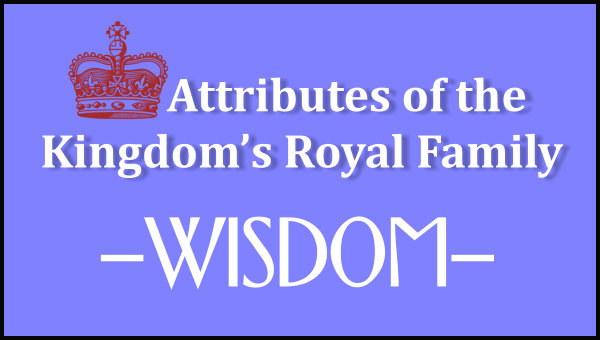By Tyson Thorne

The Bible makes it clear that we are children of God, which means we are all princes and princesses of the Kingdom of God. So why do most of us live like confused peasants? While God never promises us health and wealth, those things are often benefits of living wisely (though not always, see the prophet Amos as a great example).
The first lesson in living like Kingdom royalty then is being kingdom wise. There are some forms of wisdom that are looked down upon, such as the "wisdom" of the serpent in the Garden of Eden (Genesis 3). But when wisdom comes from God there are great benefits and responsibilities.
To be kingdom wise one must start with the basic premise of biblical wisdom: everything in the universe, from the operation of the solar system to the way one should live life, operates around a predefined moral order. Because God is a moral being, he demonstrates his morality and wisdom in creation. Even though the universe operates upon wise rules they are not rigid; God can, and has and will continue to interrupt that system as he wills. Recognizing this truth leads to another, human wisdom starts with a healthy fear of God. This fear isn't terror, but is more than mere reverence and is best described as recognizing God for who he is, a loving God who will one day judge each person for their choices.
How does this understanding of wisdom play out in life? Jesus told us to be wise as serpents and innocent as doves (citation needed). Making wise decisions means using one's intellect and the information at hand to make decisions that lead to the best possible outcome. This is the style of wisdom represented in the book of Proverbs, which reveals how to navigate difficult decisions. Life philosophies like "do what feels good" or "do what you like for tomorrow may never come" guide only those who end up in the worst places. Evaluating life choices through the lens of godly morals leads to a life devoid of regret. This is the easy part of living wisely, but what of those decisions that are not moral in nature, or when we are faced with how to act toward a person rather than a situation?
There is a famous scene in the Bible where Solomon is tasked with determining the true mother of an infant. In the age before DNA testing was available, he offered to cut the child in half and to give each woman half the baby. He wouldn’t have done so, of course, but he knew the real mother would not let harm come to the child. Few of us face such dilemmas today, but the principle remains. We can think through various “what if” scenarios until we find one that will either reveal a truth or is most likely to end in the best outcome. Reason is the friend of wisdom, but reason doesn’t go far enough. In some circumstances the “best outcome” from our perspective might be achieved through an immoral behavior.
Erasmus once wrote, “It is the main task of a good prince to see that he does not become a bad one.” Therefor immoral scenarios are to be rejected by Kingdom royalty. Instead, we must make moral choices, even if it does not lead to the end result we desire. So there is a hierarchy involved in living wisely, godly moral (or virtue) is highest, reason is second, and outcome is third. When we evaluate decisions based on this hierarchy we can be certain to remain innocent as a dove while exercising the wisdom (or craftiness) of a serpent.
|
|
